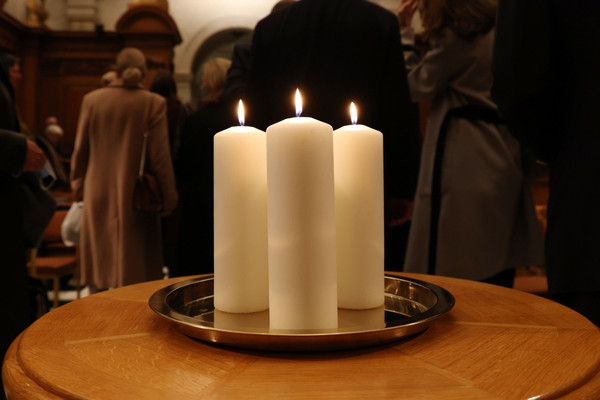NEWS

Review: Journalists’ Commemorative Service 2023
Written by Ed Pracy, journalist & this year’s Guild of St Bride Journalism Bursary holder
This year’s Journalists’ Commemorative Service, entitled ‘Without Fear or Favour’, came almost a month to the day since the conflict between Israel and Gaza broke out.
A nearly full church heard that at least 39 journalists and media workers were among more than 12,000 killed since the war began on 7th October, with over 10,600 Palestinian deaths in Gaza and the West Bank and 1,400 deaths in Israel, according to the Committee to Protect Journalists, which promotes press freedom worldwide.
The saddening spike in the number of journalists killed in 2023 made the London service at St Bride’s Church, Fleet Street, even more poignant.
The service brought together families and friends of journalists who had died during the past year, as well as colleagues who also came to pay their respects.
Download Order of Service (pdf)
The Revd Canon Dr Alison Joyce, Rector, in her welcoming speech, shared her own harrowing experience of attempts to leave Israel at the start of the conflict, alongside the similar experience of two other family members. She also mentioned the difficulty the church was having trying to keep the tally of journalists killed in the region up to date – the number so far is believed to be 39, making it the most deadly war for journalists of the past 30 years.
Those present heard speeches from BBC News veteran journalist Sophie Raworth, Lord Black, the Master of the Guild of St Bride, and Sir John Whittingdale, minister for media, tourism and creative industries.
In her speech, Raworth commemorated the life and work of colleague George Alagiah, journalist and television presenter, who died from bowel cancer earlier this year. She mentioned how George was “unusual in the world of TV because he had little ego”, and that he was an “endlessly positive and optimistic” individual.
The BBC newsreader also spoke of lagiah’s time as BBC’s Africa correspondent in the 1990s, much of which was spent in apartheid South Africa. The BBC’s Allan Little was quoted in the speech as saying he looked up to George as “a big brother”, as well as stating that it was his empathy that “shone through always in both his work and his life”.
Perhaps the most touching part of the speech came at the end, when George’s own words – written only a few weeks before his death – were read out. In them, he reminded everyone: “If you haven’t already told the people you love that you love them, tell them; if you haven’t already told them how vulnerable you sometimes feel, tell them; if you want to tell them that you’d like to be with them until the front hall stairs feel like Everest, tell them. You never know what is coming around the corner.”
Lord Black’s speech included an excerpt from the book First to Fight by Roger Moorhouse, which relayed the remarkable experiences of Clare Hollingworth during her time in Poland in 1939. Hollingworth, who died at the age of 105, was sent to Poland just three days into her first job at the Daily Telegraph and tasked with providing information about Nazi tanks on the German-Polish border. She was cited for her sharp observation that the German war campaign was moving too swiftly through Europe to be stopped at that moment.
In his speech, Lord Black indicated the extraordinary situations journalists can periodically – or in some cases regularly – find themselves in, but also provided a stark reminder of the essential role they play in times of crisis.
Sir John Whittingdale was the final speaker. In his address, he recognised the opportunity bestowed upon him to “put on record how important we regard the work journalists do, and our commitment to trying to improve their safety both here and in hostile environments across the globe”.
He went on to offer potentially the most impactful remark of the service, when he declared that “the world is more dangerous and the task harder than perhaps at any time since this service was held”.
He mentioned that, despite the exceptional risks that journalists in war zones like Palestine and Ukraine take, those in the profession continue to be killed in regions where direct military conflict is not taking place. Mexico and the Philippines have proven to be particularly dangerous places for journalists over the past year, with six already dead across the two countries.
The minister also highlighted a worrying trend in the erosion of press freedom around the world: according to UNESCO, 85 per cent of the world’s population has experienced a decline in press freedom over the past five years. However, he was keen to add that the UK has played a significant role in trying to curb this trend, most notably through the Media Freedom Coalition which it helped found.
Posted On: Tuesday 14th November, 2023
READ OR LISTEN TO OTHER SERVICES

STAY UP TO DATE
WITH NEWS FROM ST BRIDE’S
Subscribe to our newsletter to receive alerts for
events and advance information about seasonal services.
We protect your data and never overwhelm your inbox.
SUBSCRIBE